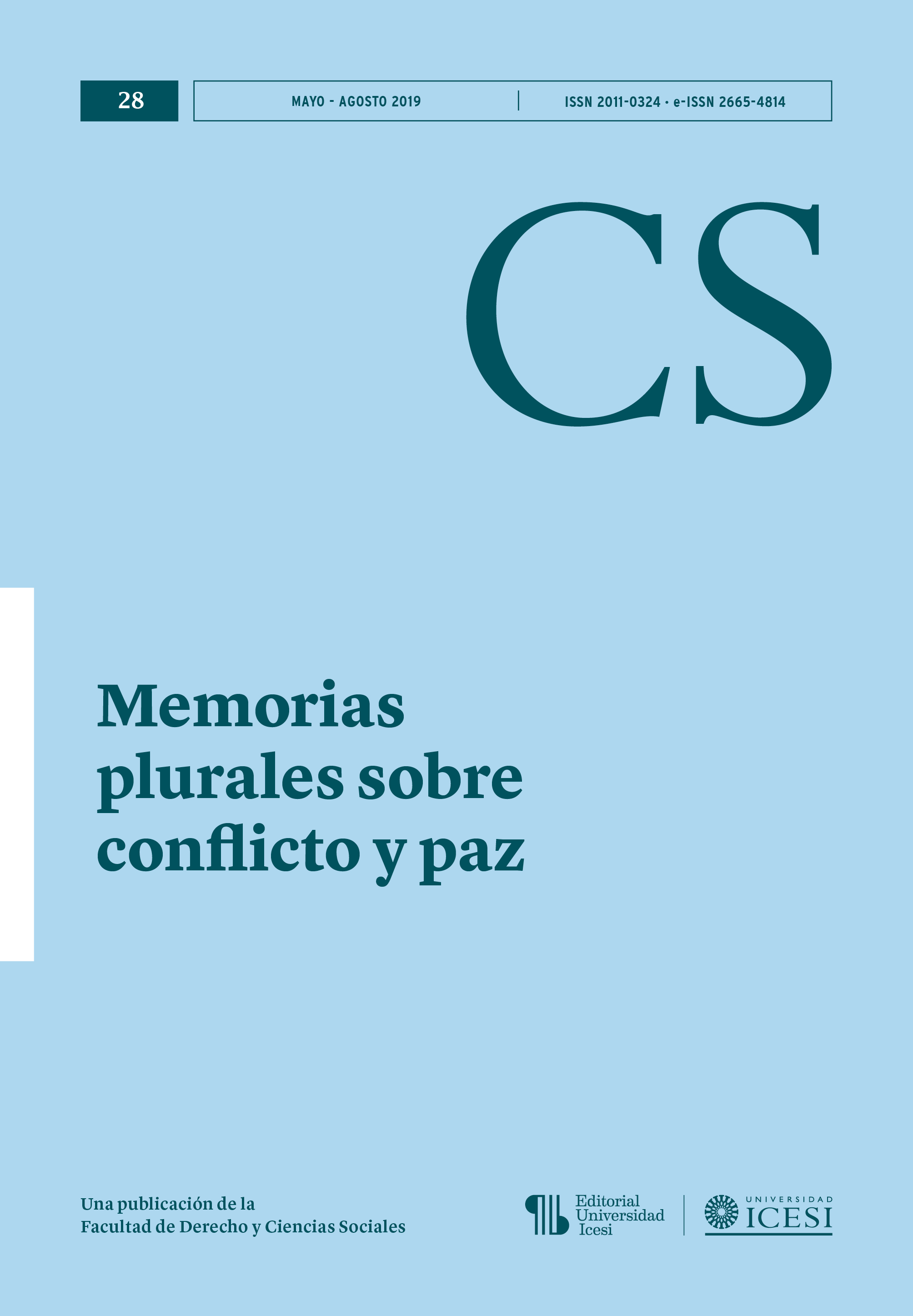Community Narratives and Territorial Dynamics of Colombian Peace Agreement Implementation Process in Miranda, Cauca (2016-2018)
DOI:
https://doi.org/10.18046/recs.i28.3203Keywords:
FARC-EP Guerrilla, Peasants, Illicit Crops, Laying Down Weapons, The Havana Peace AgreementAbstract
In compliance with the Colombian Peace Agreement, signed in 2016, the municipality of Miranda was one of the designated sites for the congregation and disarming of the oldest guerrilla in Latin America: FARC-EP. In addition, it was one of the 170 prioritized municipalities by the national government for the implementation of a series of mechanisms for territorial planning in the context of peace, including a program that deals with the substitution of the large swaths of coca and marihuana that can be found in the region: the National Program of Substitution of Illicit Crops (PNIS). This case report, textual and photographic, comes from the accompaniment carried out between the end of 2016 and 2018 of the implementation of several of the commitments as signed by the guerrilla and the Colombian government. Based on a deeply ethnographic and territorial perspective, this report critically exhibits the narratives of failure that surged within the ex-combats from the Rehabilitation Zone “Dagoberto Ortiz” in Monte Redondo, as well as the dynamics of social organizations and governmental institutions in the process of state-building during this important moment of social and political transition.
Downloads
References
Calveiro, Pilar (2006). Los usos políticos de la memoria. En Sujetos sociales y nuevas formas de protesta en la historia reciente de América Latina (pp. 359-382). Buenos Aires: CLACSO.
Camacho, Juana (2015). Paisaje y patrimonio en La Mojana, Caribe colombiano. Geografia Ensino & Pesquisa, 19, 90-100.
Fernández, Vladimir (2010). Identificación y caracterización de conflictos interétnicos por tierra, territorio y minería en el norte del departamento del cauca. Bogotá: Corporación Andando en Paz, IKV Pax Christi.
Grajales, Jacobo (2011). The rifle and the title: paramilitary violence and land control in Colombia. JPS, 38(4), 771-792.
Hristov, Jasmin (2005). Indigenous Struggles for Land and Culture in Cauca, Colombia. The Journal of Peasant Studies, 32(1), 88-117.
KROC Institute for International Peace Studies (2017). Estado efectivo de implementación del Acuerdo de Paz en Colombia. Informe 1: Diciembre 2016-Noviembre 2017. Bogotá: University of Notre Dame.
KROC Institute for International Peace Studies (2018). Estado efectivo de implementación del Acuerdo de Paz en Colombia. Informe 2: Diciembre 2016-Mayo 2018. Bogotá: University of Notre Dame.
LeGrand, Cathenne (1988). Colonización y protesta campesina en Colombia (1850-1950). Bogotá: Universidad Nacional de Colombia.
Mate, Reyes (2006). Memoria e historia, dos lecturas del pasado. Revista Letras Libres, 53, 44-48.
Mesa de Conversaciones (2017). Acuerdo final para la terminación del conflicto y la construcción de una paz estable y duradera. Bogotá: Oficina del Alto Comisionado para la Paz. Recuperado de http://www.altocomisionadoparalapaz.gov.co/herramientas/Documents/Acuerdo-Final-AF-web.pdf
Piper-Shafir, Isabel; Fernández-Droguett, Roberto; Íñiguez-Rueda, Lupicinio (2013). Psicología social de la memoria: espacios y políticas del recuerdo. Psykhe, 22(2), 19-31.
Restrepo, Eduardo (2002). Políticas de la alteridad: Etnización de “comunidad negra” en el Pacífico sur colombiano. The Journal of Latin American and Caribbean Anthropology, 7(2), 34-58.
Romero, Roberto (2012). Unión Patriótica. Expedientes contra el olvido (2.ª ed.). Bogotá: Centro de Memoria, Paz y Reconciliación. Recuperado de http://centromemoria.gov.co/wp-content/uploads/2015/05/Union-Patriotica-expedientes-contra-el-olvido.pdf
Vélez-Torres, Irene (2014). Governmental Extractivism in Colombia: Legislation, Securitization and the Local Settings of Mining Control. Political Geography, 38, 68-78.
Vélez-Torres, Irene (2018). Una mirada histórica y socio-ambiental para repensar y renombrar los conflictos entre comunidades étnicas del Alto Cauca, Colombia. Ágora USB, 18(1), 38-54.
Villar, Leonardo; Ramírez Juan Mauricio (2014). Infraestructura regional y pobreza rural. FEDESARROLLO - Centro de investigación económica y social. Working paper, 61. Recuperado de: https://repository.fedesarrollo.org.co/bitstream/handle/11445/234/WP_2014_No_61.pdf?sequence=1&isAllowed=y
Downloads
Published
Issue
Section
License
Copyright (c) 2019 Irene Vélez-Torres

This work is licensed under a Creative Commons Attribution-NonCommercial 4.0 International License.
© Reserved Copyright
Material in this publication may be reproduced without authorization, provided the title, author and institutional source is acknowledged.
The content published in Revista CS is distributed under the Creative Commons BY-NC 4.0 Attribution/Recognition-NonCommercial 4.0 International license.
You are free to:
Share — copy and redistribute the material in any medium or format.
Adapt — remix, transform, and build upon the material.
Under the following terms:
Attribution — You must give appropriate credit , provide a link to the license, and indicate if changes were made . You may do so in any reasonable manner, but not in any way that suggests the licensor endorses you or your use.
NonCommercial — You may not use the material for commercial purposes.











